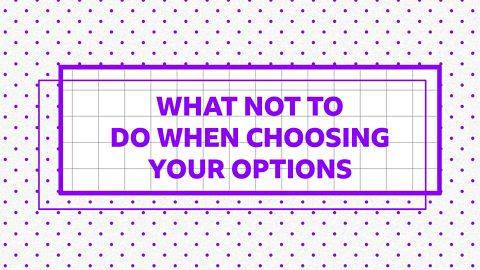Choosing your GCSE options is a great opportunity to think about what you'd like to do in the future. Watch the video below for five things you need to know when you choose your options in Northern Ireland.
You can also explore subjects you're interested in by taking a tour around The Ultimate Options Guide for Northern Ireland further down the page, or check out Ultimate Options Guides for all nations here.
Helen: Choosing your options is a great opportunity to think about what you would love to do in the future.
Helen: In Northern Ireland, you usually take your GCSEs in year 11 and 12; so you’ll need to choose the options you want to take in Year 10, and maybe earlier.
T'Challa: Most students will take a minimum of five GCSEs including the compulsory subjects of Maths and English Language. Not every school requires you to take Science, and you can take it as a single or double award or as three separate GCSE subjects. With English, you can take both English Language and English Literature.
Helen: Some specialist schools may also require you to take other subjects such as Irish.
Helen: You can have fun choosing your other subjects, and the choices are different in every school. You might pick an art based subject like Drama, a humanities subject like Geography or a Modern Foreign Language. Your school might also offer courses that are more work-related by nature, like a BTEC in Travel and Tourism or a GCSE in Construction.
If you change your mind, it’s sometimes possible to change courses, if it works with your timetable. This will depend on your individual school.
Once you've chosen your options you'll usually have two years working towards your exams and assessments. The more GCSEs you pass, the more pathways are available to you to shape your future, which makes the hard work really worthwhile. You'll have more decisions to make when your results arrive. If you don't get the results you need, there may be the possibility to resit exams. Be true to yourself and choose what’s right for you.
Explore The Ultimate Options Guide for Northern Ireland
There are many GCSE options on offer in Northern Ireland and you can explore some of the most popular subjects in The Ultimate Options Guide. It's intended as a companion to the information, advice and guidance offered by your school and teachers, so make sure you go along to your own school's options evening, if they have one, and check with your teachers to find out what rules apply in your school and which subjects might be best for you and your future.
When do I need to choose my GCSE options?
In Northern Ireland, you usually take your GCSEs in Year 11 and Year 12, so you'll need to choose the subjects you want to study for GCSE in Year 10 – but in some schools this might happen in Year 9, so it's never too early to start thinking about your options!
Different schools will ask students to pick their options at different times, but you'll get plenty of notice and information from your teachers.
What GCSEs do I have to take?
Most students will take a minimum of five subjects at GCSE, including the compulsory subjects of Maths and English Language. You may also take English Literature and some schools may require you to take other subjects, like Irish.
Not every school requires you to take Science, but if you are required to it may be taken as a single or double award, or split into the three separate sciences (Biology, Chemistry and Physics).
If you're unsure, it's best to check with your teachers to find out what rules apply in your school.
What are the optional subjects?
You can have fun choosing your other subjects, the choices are different in every school, but you may have the option to choose:
- A modern foreign language. The most commonly taught are French, German and Spanish, but some schools also offer languages like Mandarin and Japanese. Some schools require you to take a modern foreign language, so check with your teachers whether these are part of your options or compulsory.
- A humanity subject like History, Geography, or Religious Studies.
- An arts subject like Music, Drama, Art and Design, or Media Studies.
- A technical subject such as Design and Technology, Food Technology, or Computer Science.
Your school may also offer a work-based course like a BTEC in Travel and Tourism or a GCSE in Construction.
To help you make up your mind, ask your teachers about subjects that you might be interested in but haven’t taken yet, so they can explain what will be taught on the course. You can also check out GCSE Bitesize to find out more about each subject.


What if I'm unhappy with my choices once I start?
If you're unhappy, you might be able to change subjects, but it’s likely to depend on whether changing will cause subjects clashes on your personal timetable. Remember: choosing your GCSE subjects is also choosing your timetable, so think hard and ask your teachers about the planned schedule for the subjects you are keen on.
What's next?
Once you've chosen your options, you'll usually have two years to work toward your exams and assessments. The more GCSEs you pass, the more pathways are available to you to shape your future – this makes your hard work really worthwhile. You'll have more decisions to make once your results arrive. If you don't get the results you need, there may be the possibility to resit your exams.

If you need support
You should always tell someone about the things you’re worried about. You can tell a friend, parent, guardian, teacher, or another trusted adult. If you're struggling with your mental health, going to your GP can be a good place to start to find help. Your GP can let you know what support is available to you, suggest different types of treatment and offer regular check-ups to see how you’re doing.
If you’re in need of in-the-moment support you can contact Childline, where you can speak to a counsellor. Their lines are open 24 hours a day, 7 days a week.
There are more links to helpful organisations on BBC Action Line.

The Ultimate Options Guide 2025
Find out more about some of the subjects that may be on offer when choosing your GCSE or National options.

Top tips on choosing the best GCSE or National options for you
Some top tips to consider when looking at what the best GCSE or National options are for you.

What NOT to do when choosing your GCSE or National options!
Our experts give some advice on what NOT to do when you choose your GCSE or National options.
